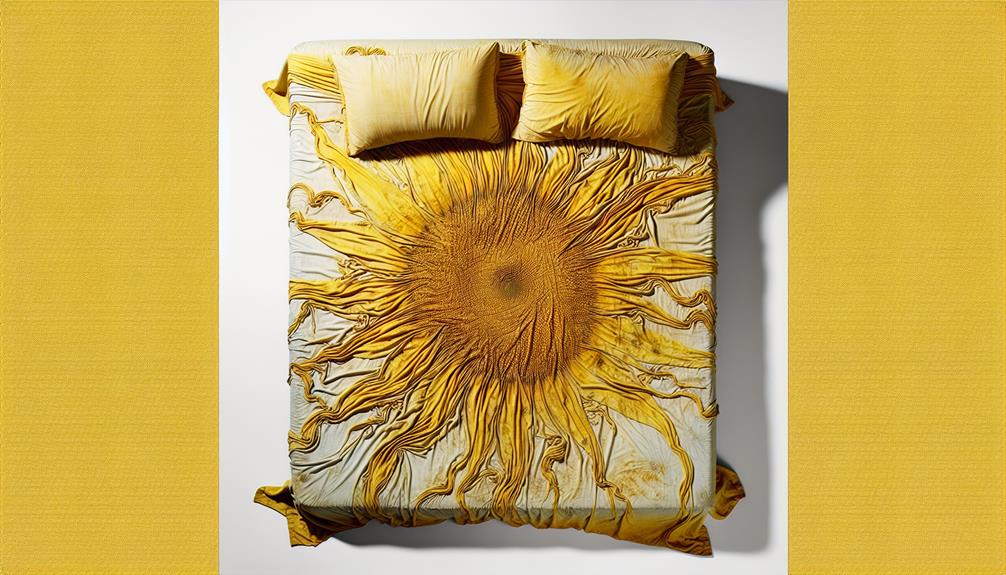So, you ever wonder why my bed sheets seem to have a golden touch that's not quite luxurious but more on the, well, yellow side?
Let's just say, it's not all about the sunshine.
Have you ever considered the secret life of sweat and body oils when it comes to bedding?
Trust me, the answer might surprise you.
Table of Contents
Key Takeaways
- Fabric quality impacts yellowing rate and maintenance.
- Sweat, oils, and skin cells contribute to yellow stains.
- Detergent residue can dull sheets and attract dirt.
- Use proper care and maintenance to prevent and treat yellowing sheets.
Common Causes of Yellowing Bed Sheets
Yellowing bed sheets can be caused by a variety of factors ranging from sweat and body oils to improper washing techniques. However, two significant factors that contribute to this issue are fabric quality and sun exposure. The quality of the fabric plays an important role in how well bed sheets withstand wear and tear, affecting their resistance to yellowing. Lower quality fabrics may discolor more quickly than higher quality ones due to their composition and how they react to frequent use and washing.
Sun exposure is another key factor. While natural light can help to freshen and brighten fabrics, overexposure to direct sunlight can lead to yellowing. The UV rays in sunlight can break down the fibers in bed sheets, causing them to weaken and discolor over time. It's essential to balance the benefits of sun exposure with the potential harm it can cause to the fabric. By being mindful of these factors, one can better preserve the quality and appearance of their bed sheets.
Impact of Sweat and Body Oils
Sweat and body oils can greatly impact the color and condition of your bed sheets over time. During sleep, our bodies naturally produce sweat and oils, which can transfer onto the sheets. These substances contain compounds that, when in contact with the fabric of your sheets, can lead to the formation of yellowish stains. The sweat stains are particularly noticeable on lighter-colored sheets, but they can affect any bedding.
Body oils impact the sheets by not only causing discoloration but also by attracting dust and dirt, which further exacerbates the yellowing effect. Over time, if these stains aren't addressed promptly, they can become more challenging to remove. Additionally, body oils can contribute to a stale odor in your bedding if not washed regularly.
To combat the impact of sweat and body oils on your bed sheets, it's essential to wash them frequently using the appropriate cleaning methods. By maintaining a consistent washing routine, you can help prevent the buildup of sweat stains and body oils, keeping your sheets fresh and vibrant for longer.
Role of Detergent Residue
The lingering presence of detergent residue on bed sheets can contribute to the gradual dulling of their color and the potential onset of unwanted odors. When detergent residue builds up on sheets, especially depending on the fabric type, it can trap dirt and oils, leading to discoloration over time. Different fabric types may react differently to detergent residue, with some being more prone to yellowing.
Additionally, the quality of water used to wash the sheets can also play a role. Hard water, for example, contains minerals that can interact with detergents, leaving behind residues that may contribute to yellowing. To prevent this, using the right amount of detergent, choose a detergent suitable for your water quality, and thorough rinsing.
Contribution of Skin Cells
Skin cells shed from our bodies while we sleep, contributing to the gradual discoloration of bed sheets. This natural process of skin cell turnover means that our sheets are constantly exposed to dead skin cells that can lead to yellowing over time. Understanding the role of skin cells in this discoloration can help us take better care of our bedding and maintain its freshness.
- Skin Cell Turnover: The constant shedding of skin cells during sleep provides a regular source of material that can accumulate on our bed sheets, leading to yellow stains over time.
- Bedding Hygiene: Regularly washing and changing your bed sheets can help remove the buildup of skin cells and prevent discoloration caused by these particles.
- Moisture and Oil: Skin cells are often accompanied by moisture and natural oils, which can further contribute to the yellowing of bed sheets.
- Protective Measures: Using pillowcases and mattress protectors can act as a barrier, reducing direct contact between skin cells and the sheets, hence minimizing yellowing.
Prevention and Treatment Tips
To maintain the freshness of your bed sheets and prevent yellowing, implementing proper cleaning routines and protective measures is essential. When it comes to fabric care, using mild detergents and avoiding bleach can help preserve the color and quality of your sheets. Additionally, washing your sheets in cool water and avoiding high heat when drying can prevent premature yellowing. For color restoration, consider using color-safe oxygen bleach or a mixture of baking soda and white vinegar to brighten and whiten your sheets.
| Fabric Care | Color Restoration |
|---|---|
| Use mild detergents | Try color-safe oxygen bleach |
| Wash sheets in cool water | Use a mixture of baking soda and vinegar |
| Avoid bleach | |
| Dry on low heat |
Frequently Asked Questions
Can Using a Fabric Softener or Dryer Sheets Contribute to Yellowing Bed Sheets?
Using fabric softener can impact the color of bed sheets, potentially leading to discoloration. Dryer sheets might also contribute to yellowing. It is crucial to take these factors into account when caring for linens to maintain their quality.
How Often Should I Replace My Bed Sheets to Prevent Yellowing?
I replace my bed sheets every 1-2 weeks to prevent yellowing. Laundering habits play a big role. Wash them in cool water with mild detergent. Sunlight exposure can also cause discoloration, so I dry them indoors.
Are There Any Specific Types of Materials or Fabrics That Are More Prone to Yellowing?
Natural fibers like cotton can yellow due to sweat and oils. Synthetic fibers may also discolor over time. Washing in warm water and avoiding high heat drying can help prevent yellowing.
Can Using a Mattress Protector Help Prevent Yellowing of Bed Sheets?
Using a mattress protector can greatly extend the longevity of your bed sheets by preventing stains and maintaining mattress care. It's a simple yet effective way to make sure your bedding stays fresh and clean.
Is It Possible for Certain Medications or Skincare Products to Cause Yellowing of Bed Sheets?
Certain medications and skincare products can indeed cause yellowing of bed sheets. To combat this, I recommend washing sheets promptly, using color-safe bleach alternatives, and choosing skincare items that don't contain ingredients known to discolor fabrics.
- Tetron Fabric for Marine Applications: Durability and Use Cases - June 18, 2025
- Tetron Fabric for Outdoor Furniture: Weather Resistance and Care - June 18, 2025
- Tetron Fabric for Wall Coverings: Style and Application Tips - June 18, 2025






